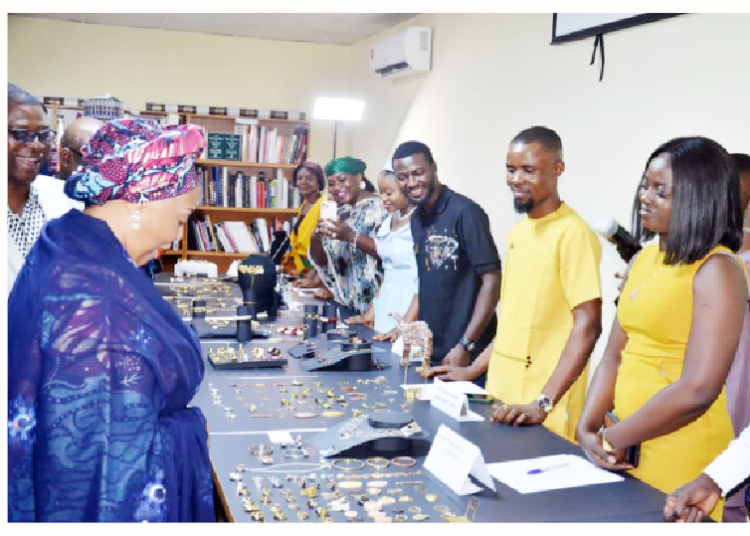Nigeria’s dwindling revenue profile has prompted the federal government’s drive toward diversifying Nigeria from a mono-product economy dependent on fossil fuel. Two major sectors – mining and solid minerals sector and the agricultural sector – hold the candle for others in this quest for economic diversity and value addition.
This fact is not lost on the Federal Ministry of Mines Development, which has initiated several programmes to create a sustainable value chain that will create both wealth and jobs for Nigeria and Nigerians.
One such programme is the master gemstone and jewellery-making and design skill training of about 40 young Nigerians selected from across all the states of the federation.
This programme was embarked by the federal government programme through the Ministry of Mines and Steel Development, and facilitated by the Mineral Sector Support for Economic Diversification Project (MinDiver), to achieve sustainable development of the gemstone and jewellery industry in Nigeria.
The master gemstone and jewellery-making and design training programme recently held the graduation ceremony for the Batch 2 of the trainees on Thursday, October 13, 2022 at the Gemstone and Jewellery Centre Airport Road, Abuja, during which 20 trainees were passed out after a more than six-months of training.
Speaking at the occasion, the minister of state in the Ministry of Mines and Steel Development (MMSD), Senator Gbemi Saraki, who represented her principal, Arc Olamilekan Adegbite, expressed pleasure at the successful completion of the second batch of the Master Gemstone and Jewellery making and design training in Nigeria.
She congratulated the World Bank and the MinDiver Project for the initiative and laudable endeavour.
Senator Saraki recalled that the strategic national training programme on gemstone and jewellery production was flagged off by Minister Adegbite in November 2021 with first batch of 21 trainees from states across the country.
According to her, the skill training of the selected youths in gemstone and jewellery production was envisaged to transform Nigeria’s jewellery industry.
She further noted Nigeria, with its large population, has a huge-insatiable appetite for jewellery and that it is imperative to create a local jewellery industry that would substantially meet local demand for quality jewellery products, increase import substitution, create jobs and boost the export value of Nigeria’s gemstones and jewellery.
LEADERSHIP Sunday reports that Nigeria is hugely blessed with several varieties of mineral resources, both solid and otherwise, including varieties of precious and semi-precious gemstones.
Some of the most popular Nigerian gemstones include Sapphire, Aquamarine, Beryl, Emerald, Tourmaline, Ruby, Garnet, Amethyst and Zircon which are located across the country.
The minister, however, lamented that a large quantity of them are illegally exported out of the country in raw forms, stressing the need for value addition so that the country can reap bountifully from its mineral resources.
“We all know that the value of a gemstone increases when it is cut and polished, however, majority of gemstones mined in Nigeria are being exported without any value addition since the technical know-how and machinery required in cutting, polishing and finishing jewelry are generally lacking in the country.
“As a result, the Nigerian economy does not benefit financially from gemstone trade and value addition. The current contribution of the solid minerals sector to the country’s overall GDP is less than 1% and reports in 2019 revealed that gemstones worth $3billion are exported annually from Nigeria, mostly unofficially, with low revenue returns. To bridge these gaps, it has become necessary to build capacity in the jewellery making and design,” she said.
According to her, it was to achieve this purpose that the Ministry drew up a roadmap for the development of Nigeria’s mineral resources, which the MinDiver Project has been supporting the implementation as part of its activity of facilitating downstream sector development aimed at enhancing value-addition to mineral products.
Senator Saraki told the beneficiaries what is expected of them going forward.
She said: “By this intensive jewellery making training programme, government’s expectation is that you will make the sector proud, become job creators and facilitate the growth of small and medium scale enterprises in the jewellery industry value-chain.
“As the beneficiaries of this initiative, I encourage you to be motivated by the wide variety of gemstones in Nigeria and use the skills and knowledge you have acquired to advance the industry to the next level. With your acquired knowledge from this training, it is my belief that you will form the new army of jewellers who will create spectacular products out of the mineral deposits in Nigeria with great aesthetic for commercial value and would have achieved the objective of the development envisaged when this programme was conceived and designed.
“It is our hope that, with this milestone achievement, you will put your training skills into good use so that in the nearest future, Nigerians would not be going abroad to buy their jewelleries.
“I urge you to work very hard to achieve the aim and objectives of the programme, as the industry is versatile and has a great future in Nigeria.
She expressed belief that jewellery industry when fully harnessed could contribute significantly to national economic growth by creating massive job opportunities along its value chain.
“In the long run, we want to transform from large consumer of foreign jewellery products to high quality local jewellery producers to save the country the huge foreign exchange expended on jewellery imports,” she said.
Saraki announced that in fulfillment of Minister Adegbite’s earlier assurance to the first graduates of this programme, the MMSD through the Mindiver Project had concluded plans to support the graduates of batch-1 and batch 2 with stater packs motivate them to put their knowledge to good use and make a difference in the in the gemstone and jewellery eco-system.
Project coordinator, MinDiver, Engr. Sallim Salaam, said the idea behind the MinDiver Project’s master trainer programme is that beneficiaries would in turn train up others in the trade so that the multiplier effect will be felt positively on the society.
Engr Sallaam told the trainees: “Do not dump your certificates in your cupboards but go ahead and practice what you have been taught. That is the crux of the programme.”
He reiterated that the MinDiver Project is interested in promoting the gemstone and jewellery industry in Nigeria to attract investment, create jobs and alleviate poverty.
Senior technical adviser, MinDiver, Mr Linus Adie, spoke in similar vein: he said the aim of the federal government for this programme, would be realized when the participants go ahead to train others and spread the knowhow in gemstone and jewellery production.
Adie charged the beneficiaries to return to their states and seek the support of state governments to set up.
Pauline Held, who represented the consultant master trainers said what the beneficiaries had received was a strategic step for the future. She asked all the stakeholder to continue to work together so they can achieve more.
A gemstone enthusiast, Mr Henry Ogbulogo, of the Federal Character Commission, in his speech, said he was pleased to find that the country’s federal character principle was employed in selecting the beneficiaries, adding that Nigeria needs people with handiwork.
The representative of the graduating class, Mr Suleiman Ahmed, thanked the minister and the MMSD for empowering them with the knowledge and craft of jewellery making, adding that at the long run the participants, when they are fully started, will earn foreign direct investment and boost the country’s GDP. He, however, made a request.
Ahmed: “As trainees, we need startup packs or grants, etc. ,. so that we can take off. We applaud the instructors; they really did the needful; they were really committed to impart this knowledge to us.”
Mr Ahmed, who is from Kano State, later told LEADERSHIP Sunday that he was a gemologist before the training but that he had learnt new things.
“I have been into cutting, polishing, testing and grading of precious stones, but not into incorporating the stone into jeweleries, until this training.”
Another beneficiary of the training, Onyegba Chibugo from Abia State, who said she was the last intake of the second batch and trained for only five months, could not control her excitement when she spoke to LEADERSHIP Sunday.
“I am so excited to be part of this. I intend to go to Lagos for more training to learn brooch making and cufflinks.
Onyegba was particularly elated that she was able to personally produce the items jewellery items she showcased on her stable for the minister’s perusal.
On how far she intends to go with her new skills, she said she had finally found her career.
“I intend to have a career in this business. I would like to go abroad for further training. One of our master trainers told us what we have just done is like preamble – that we need to seek further training to become really proficient in gemstone and jewellery making.”
She expressed her gratitude to the minister, the ministry and the teachers and coordinators for this opportunity, adding that they provided everything the trainees needed.
“The knowledge they gave us here is priceless. With this knowledge I can get a loan and start even from my house if I don’t have a shop. They have really empowered us,” she concluded.
For another beneficiary, Makanjuola Feyisayo, from Kwara State, she said the training had lasted six and a half months, adding that it had enabled her to produce a variety of jewellery products, including bracelets, rings, bangles, pendants, earrings, paper clips, wooden rings, and so on.
On how she felt being part of the scheme, she enthused: “It’s a lifechanging opportunity and I am fortunate to be involved. It is a knowledge people travel abroad at great expense to acquire but they have brought it here to Nigeria.”
LEADERSHIP Sunday reports that the second batch of trainees under the Master Training in Jewellery Making and Design, under the Federal Ministry of Mines and Steel Development, supported by the World Bank-assisted MinDiver Project, were 20 in number while the first batch were 21, bring the number to 41.





